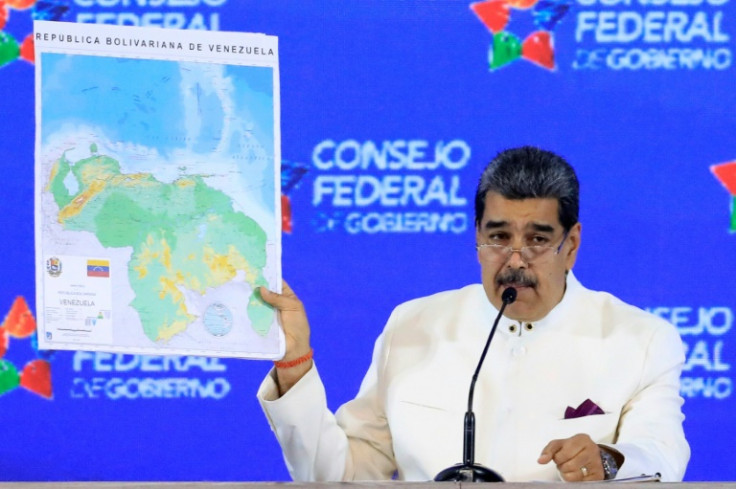
A Guyanese army helicopter with seven people on board was reported missing Wednesday near the border with Venezuela, an official said, as tensions between the two neighbors soar over a disputed oil-rich territory.
Guyanese Army Chief of Staff Omar Khan told a press conference that contact had been lost with the helicopter shortly after takeoff in bad weather, adding he had "no information to suggest that" Venezuela had been involved.
The report of the missing aircraft added to a fast-escalating border feud over the oil-rich Essequibo region, controlled by Guyana for more than a century but which Venezuela also claims and has voiced intent to take over.
Amid the soaring tensions, compounded by a controversial referendum in Venezuela over the weekend, Guyanese and Venezuelan officials agreed earlier in the day to keep "communication channels open."
In Caracas, the government said its top diplomat Yvan Gil had a phone call with Guyanese counterpart Hugh Todd "to discuss the issue of the territorial dispute."
The discussion took place at Guyana's request, it said in a statement.
The Brazilian army, meanwhile, said it was reinforcing its presence in the northern cities of Pacaraima and Boa Vista as part of efforts "to guarantee the inviolability of the territory."
And the United States said it was closely watching the situation.
"It's concerning, we're watching this very, very, very closely," National Security Council spokesman John Kirby told reporters.
The long-running dispute over Essequibo, which comprises some two-thirds of Guyanese territory, has intensified since ExxonMobil discovered oil there in 2015.
On Tuesday, Caracas proposed a bill to create a Venezuelan province in Essequibo and ordered the state oil company to issue licenses for extracting crude in the region.
Emboldened by an overwhelming "yes" vote in a controversial referendum on Essequibo's fate held Sunday, President Nicolas Maduro also gave an ultimatum to oil companies working under concessions issued by Guyana to halt operations within three months.
Guyanese President Irfaan Ali called Maduro's statements a "direct threat" against his country and said he would seek relief from the UN Security Council.
Guyana's armed forces were on "alert," Ali added in a rare address to the nation late Tuesday, and were in contact with "partners" including the United States.
Venezuela on Wednesday also confirmed it had arrested an American citizen -- Savoi Jadon Wright -- on accusations of "conspiring" with ExxonMobil to stop Sunday's referendum. US media said the arrest happened on October 24.
Attorney General Tarek William Saab said a Donald Trump advisor named Damian Merlo and members of the Venezuelan opposition were also involved in the "plot," though not yet arrested.
Venezuela's foreign ministry also accused Ali of giving the "green light" for a United States military presence in Essequibo, "over which Guyana maintains a de facto occupation."
Essequibo is home to 125,000 of Guyana's 800,000 citizens.
Litigation is pending before the International Court of Justice (ICJ) in The Hague over where the region's borders should lie.
Last week, two days before the referendum, the ICJ ordered Venezuela to "refrain from taking any action which would modify the situation that currently prevails in the territory in dispute."
It did not, however, grant an urgent request by Guyana to stop Sunday's referendum.
Guyana, a former British and Dutch colony, insists the Essequibo frontiers were determined by an arbitration panel in 1899.
But Venezuela -- which does not accept the ICJ's jurisdiction in the matter -- claims the Essequibo River to the region's east forms a natural border recognized as far back as 1777.
Caracas called a referendum after Guyana started auctioning off oil blocks in Essequibo in August.
Venezuelan voters were asked to respond to five questions, including whether Venezuela should reject the 1899 arbitration decision as well as the ICJ's jurisdiction.
They were also asked whether Venezuelan citizenship should be granted to the people -- currently Guyanese -- of a new "Guyana Esequiba State."
Officials in Caracas said 95 percent of voters supported the measures.
Asked about the dispute in New York, a spokesman for UN chief Antonio Guterres said "the secretary-general strongly supports the use of solely peaceful means to settle international disputes."
© 2023 Latin Times. All rights reserved. Do not reproduce without permission.







